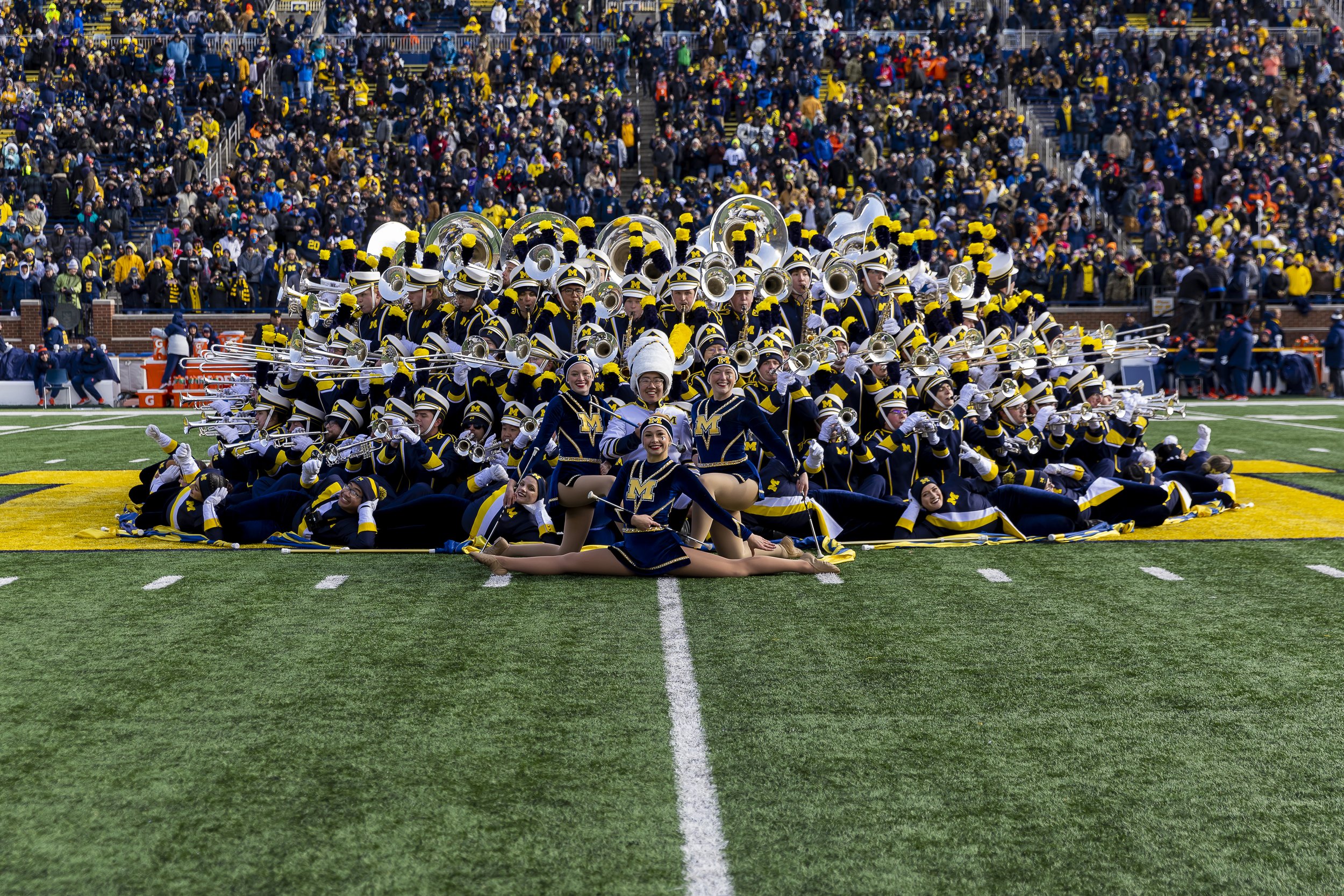OUR COMMITMENT to DIVERSITY, EQUITY, and INCLUSION
The Michigan Marching Band (MMB) embraces the notion that academic and artistic excellence is inseparable from an abiding and pervasive institutional commitment to diversity, equity, and inclusion. MMB is committed to furthering the university’s mission of ensuring that each member of our organization has an equal opportunity to thrive and to take full advantage of the resources afforded by the University of Michigan.
The Michigan Marching Band is committed to the ideal of inclusion as one of its core academic and artistic pillars. We construe inclusivity in the broadest possible terms, encompassing the equitable and fair treatment of all members of our community as well as a commitment to diversity not only with respect to traditional markers such as race, ethnicity, and gender but also to the diversity of thought, experience, and outlook upon the world.
In the Fall of 2015, the University of Michigan President issued a campus-wide charge to develop strategic plans that demonstrate our commitment to diversity, equity, and inclusion. To respond to the President’s Diversity Charge, the Michigan Marching Band adopts the following definitions and commitments.
DIVERSITY
We commit to increasing diversity, which is expressed in myriad forms, including race and ethnicity, gender and gender identity, sexual orientation, socio-economic status, language, culture, national origin, religious commitments, age, (dis)ability status, and political perspective.
EQUITY
We commit to working actively to challenge and respond to bias, harassment, and discrimination. We are committed to a policy of equal opportunity for all persons and do not discriminate on the basis of race, color, national origin, age, marital status, sex, sexual orientation, gender identity, gender expression, disability, religion, height, weight, or veteran status.
INCLUSION
We commit to pursuing deliberate efforts to ensure that our organization is a place where differences are welcomed, different perspectives are respectfully heard, and where every individual feels a sense of belonging and inclusion. We know that by building a critical mass of diverse groups on campus and creating a vibrant climate of inclusiveness, we can more effectively leverage the resources of diversity to advance our collective capabilities.
We acknowledge that establishing and maintaining policies and practices that promote a culture of broad diversity, inclusivity and equity is an endeavor that requires taking risks and consideration of different perspectives and needs of our members. It is an opportunity we seize daily in a manner that is both proactive and responsive. As a result, the Michigan Marching Band continues to explore new and creative ways of enhancing diversity, equity, and inclusion for the benefit of students, faculty, staff, and fans of MMB.
In order to more clearly gauge progress related to diversity, equity, and inclusion, steps are underway to more fully assess areas for improvement and develop MMB specific objectives and action items that fall under four prescribed domains: 1) Recruitment, Retention & Development, 2) Education and Scholarship, 3) Promoting Equitable and Inclusive Community, and 4) Service. These additional measures of success will be incorporated into the existing School of Music, Theatre & Dance (SMTD) Strategic Plan for Diversity, Equity, and Inclusion, as we continue to pursue the shared goals of SMTD.
GET INVOLVED
MMB Student Diversity & Inclusion Committee
Student-led committee of MMB members interested in encouraging a more diverse, inclusive, and equitable band experience for all members. The committee meets monthly to consider, recommend, and coordinate approaches that proactively improve various aspects of band recruitment, education, culture, and service. The students benefit from DEI-related training, as desired, and consultation and support from the SMTD Diversity, Equity, and Inclusion staff and MMB directors.
Please contact the SMTD Diversity, Equity, and Inclusion Office (smtd-dei-office@umich.edu) to get involved.
Band #125 Vision Statement
As the University of Michigan Marching Band celebrates its 125th year, we seek to honor and learn from our history and build towards an even stronger future as a premier performing arts ensemble.
We strive to advance a collaborative learning space where students from all backgrounds and identities are welcomed, valued, and united as leaders and best. We celebrate the 50th anniversary of women in the band and acknowledge the strength of those who paved the way for a more equitable ensemble. As we progress, we reaffirm our commitment to promoting a community that includes people of all genders.
We as a band family are dedicated to supporting one another on and off the field. Through our words, our actions, and our performances, we seek to exemplify values of empathy, respect, inclusivity, and equity.
Melanie McNamara
DEI Committee Co-Chair
Delaney Cadman
DEI Committee Co-Chair
GET SUPPORT
What is a campus climate concern?
Campus climate concerns may involve conduct that does not violate any law or university policy. Some cases, however, do involve conduct that may violate federal, state, or local laws or U-M policies. Below are some examples of policies that may be violated, but conduct need not violate any such policy to be considered a campus climate concern.
The Counseling and Psychological Services (CAPS) is available to foster the psychological development and emotional well-being of students through counseling and psychotherapy, preventive and educational programming, consultation and outreach, as well as contributions to the mental health professions.
The Spectrum Center is committed to enriching the campus experience and developing students as individuals and as members of communities. Their work is accomplished through a student-centered, intersectional lens.
The Office for Institutional Equity serves as a vital resource and leader in promoting and furthering the university’s commitment to diversity and equal opportunity for all members of its community.
The Office of Student Conflict Resolution promotes a safe and scholarly community in which students navigate conflict in a peaceful, socially just, and self-reflexive manner. OSCR offers a spectrum of conflict resolution pathways that are educationally focused, student-driven, community owned, and restorative in nature, which are adaptable to meet the needs of individuals experiencing conflict.
The Office of Multi-Ethnic Student Affairs (MESA), using the lens of race and ethnicity, engages the campus community and transforms the student experience to build inclusive spaces.
The Program on Intergroup Relations (IGR) is a social justice education program.
The Office of Services for Students with Disabilities supports the University’s commitment to equity and diversity by providing support services and academic accommodations to students with disabilities.
The Faculty and Staff Counseling and Consultation Office (FASCCO) provides support and assistance to University staff and faculty in resolving personal or work related concerns. Through a range of sensitive and innovative services, FASCCO seeks to enhance the emotional health, well-being and job performance of members of the university community. By providing confidential and professional counseling, coaching, training and consultation services to staff, faculty, retirees, benefit-eligible adult dependents and departments, FASCCO helps individuals develop and foster strengths and resiliency to enhance their personal and professional lives.
RESOURCES
SMTD Anti-Racism Resources
The current global movement to eradicate systemic and institutional racism signals a momentous opportunity to learn from and engage with one another; to reflect deeply on the trauma, grief, and fear experienced in Black communities and other communities of color on a daily basis; to strengthen our resolve to combat racism at the University of Michigan and beyond, and to plan for actions to carry forward. Below is a list of resources for those seeking to increase their knowledge, awareness, and understanding of DEI and anti-racism frameworks.
Have an idea, question, or concern?
Contact the SMTD Diversity, Equity, and Inclusion Office




